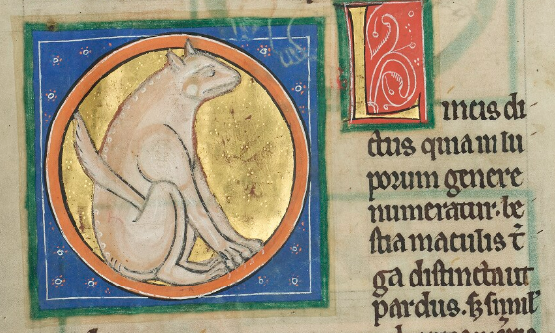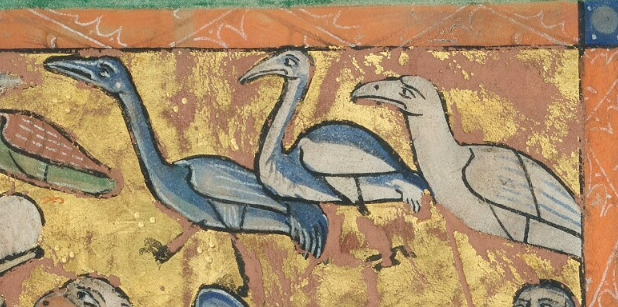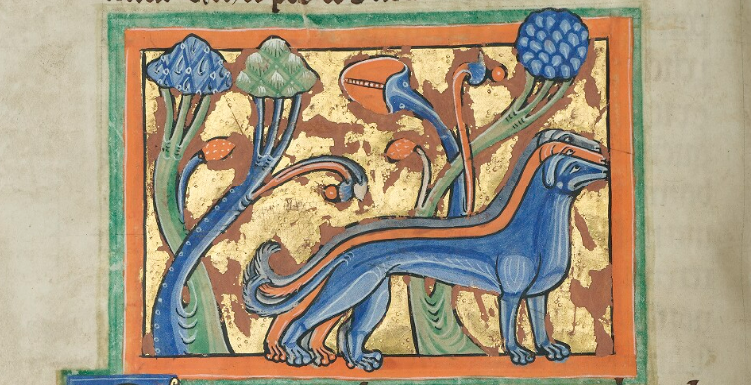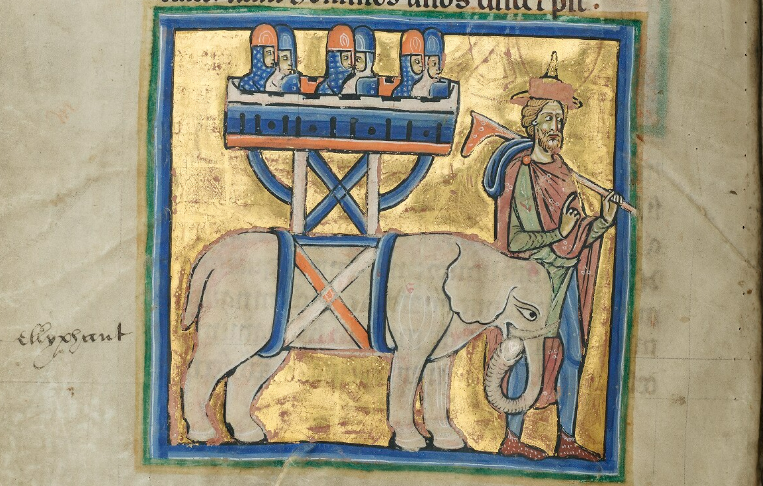It feels like only yesterday that I was welcoming you all to Oxford for the academic year, and yet here we are at the very end of Trinity Term. It has been such a fantastic and busy year, and it’s hard to believe that it’s almost over. Here is some wisdom on endings, specially for the occasion, taken from the Epistolae project:
vespere autem hora diei ultima terminatur.
[The final hour of the day is concluded in the evening.]
A letter (1156-57) from Osbert of Clare to Adelidis of Barking
I take this to mean that though the end of teaching term is in sight, there are still some hours of ‘evening’ left! You will find below a whole range of delights for this last week of full term.
This of course means that today’s email is the last proper Medieval Matters Newsletter of the academic year. In honour of this occasion, today’s guest blog is not written by a guest at all, but by me. This has been my third year as the OMS Comms Officer, and I was asked to reflect on some of the work that I do in this role and my twinned role as the Academic Mentor for the Interdisciplinary MSt in Medieval Studies. I of course answer pressing questions such as “when do you choose the manuscript images” and “what do Medievalists do in August?”, but in many ways this is less a report on the work that I do and more a celebration of some of the fantastic things Oxford’s medievalists have been up to this year. You can read the post here.
ANNOUNCEMENTS:
- The Medieval Mystery Cycle is coming back! Mark your diaries for 26 April 2025! There will be small grants available for student groups putting on plays.
- Double thanks are due to St Edmund Hall: the College has agreed to host both the plays (including catering!) AND this blog. This means that – after a time when we had to ration images due to server space problems – we can now illustrate posts to our hearts content. Please do consider writing a blog post for us – on your research, an upcoming event or a new publication. Write to Luisa or Henrike to be set up as an author on the blog.
- Living Stones has two events coming up very soon: On Saturday 29 June artists Sally Levell and Phil Whiting are leading a day-school in drawing at Iffley Church. This is a very popular annual event and spaces are limited. See https://livingstonesiffley.org.uk/events for details and tickets. Tickets are only available online, and the closing date for bookings is 17 June. On Saturday 13 July the second of our three ’12th-Century’ days includes a participatory workshop on manuscript illumination along with a talk about how the builders of Iffley Church saw themselves as inheritors of Rome. Tickets can be booked online and at the door. An appetite-whetter can be found on https://livingstonesiffley.org.uk/past-events/f/oxford-in-1160-scholars-and-pilgrims-at-st-frideswide%E2%80%99s-priory where you can listen to the thrilling talks given by Andrew Dunning and Anne Bailey on Oxford in 1160: Scholars and Pilgrims at St Frideswide’s Priory.
EVENTS THIS WEEK:
Monday 10th June:
- The Tolkien 50th Anniversary Seminar Series meets at 5pm in the Summer Common Room, Magdalen College. This week’s speaker will be John Holmes (University of Birmingham), Riddles in the Grass: the characterisation and narrative value of landscape over the fields of Rohan. For more information, please see https://tolkien50.web.ox.ac.uk/.
- The Medieval History Seminar meets at 5pm in the Old Library, All Souls College and on Teams. The Teams session can be accessed by logging in to Teams with your .ox.ac.uk account and joining the group “Medieval History Research Seminar” (team code rmppucs). Alternatively, you can use this link. If you have any difficulties please email: medhistsem@history.ox.ac.uk. This week’s speaker will be Katherine Jansen (Catholic University of America) ‘The Relics of Rome’.
Tuesday 11th June:
- The Medieval Church and Culture Seminar meets at 5.15pm in the Wellbeloved Room, Harris Manchester College. This week’s speakers will be A Book Launch: New Zealand Medievalism: reframing the medieval, edited by Anna Czarnowus and Janet Wilson (Routledge). Everyone is welcome at this informal and friendly graduate seminar.
Wednesday 12th June:
- The Medieval German Graduate Seminar meets at 11.15am in Oriel College King Edward Street 7 (Annette Volfing’s office; press the intercom buzzer to be let in). This week will be a project presentation by Mary Boyle.
- The Medieval Latin Document Reading Group meets at 4-5pm on Teams. A document is sent out in advance but homework is not expected. Please contact Michael Stansfield for further details and the Teams link.
Thursday 13th June:
- The All Souls Seminar in Medieval and Early Modern Science meets at 2-3.30pm in the Hovenden Room, All Souls College. This week’s speaker will be Zoe Screti (Harris Manchester College, Oxford), Alchemy during the English Reformation: The Troubled Times of Thomas Charnock.
- The Germanic Reading Group meets at 4pm online. Please contact Howard Jones Howard.Jones@sbs.ox.ac.uk to request the handouts and to be added to the list. This week will be on the Old Saxon Hêliand (Bradley leading).
- The Oxford Centre for Byzantine Research Annual lecture will take place at 5pm at Danson Room, Trinity College. This year’s speaker will be Peter Sarris (University of Cambridge) – ‘Justinian: Between East and West’.
- At 9.30pm, the St Edmund Consort sings Latin Compline at candlelight in the Crypt of St-Peter-in-the-East (the library church of St Edmund Hall, Queen’s Lane). No registration is needed but please be advised that the space is only accessible via uneven steps and dimly lit, and only a limited number of people can be accommodated on a first-come-first-served basis.
Friday 14th June:
- The Medieval Coffee Morning meets as usual 10:30am in the Visiting Scholars Centre of the Weston Library (instructions how to find it) with presentation of items from the special collections, coffee and the chance to see the view from the 5th floor terrace.
OPPORTUNITIES:
- CAT – Conversations Across Time. Preview 11am, Premiere 3:20pm, second performance Saturday 16 June 3:20pm. After a successful run in June 2023, artist in residence at the Physics Department Pam Davis has developed a second art-piece which links medieval theatre, women in science, and Quantum future. Free tickets for the performances moving from the Ashmolean to a second secret hidden location are available via the website https://www.citizensai.com/
- Waddesdon Internship Scheme: In 2023 Waddesdon launched Waddesdon Pathways, a brand-new, year-long internship programme. They are now looking for our second cohort to start in September 2024. Please find out more information about this, including how to apply here.
There will be a brief final email next week with some events and opportunities to look forward to over the summer, and some guidance on how to stay in contact if you are leaving. Please do send me anything you would like disseminated! But for now, I give you some fitting words from the Epistolae project, for those who hate goodbyes and endings as much as I do:
quin immo vere dilectionis ligatura reliquum nodetur in aevum
[May the bond of our true affection be knit ever more closely for all time.]
A letter (c. 732) from Lioba, abbess of Tauberbischofsheim
In other words: stay in touch! Whether you are leaving Oxford for the summer or for the long-term, the community is always here to welcome you back with open arms.
It is an honour and a priveledge to have been your herald for yet another year, and to guide you through the busy schedule of the Oxford academic term. Thank you so much for everything you have done this year: to everyone who has organised an event or seminar; given a paper; attended any number of reading groups or events; brought opportunities and CFPs to my attention; or turned up at the coffee mornings. Oxford’s medieval community is unbelievably special, and it is always such a joy to be a part of it. Long may it prosper!

St John’s College MS. 61, f. 59 v.
By permission of the President and Fellows of St John’s College, Oxford
Viewable in full at Digital Bodleian











